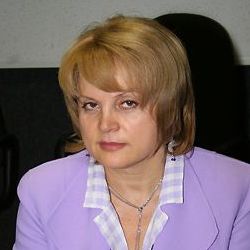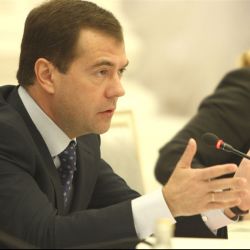On 15 March Russian President Dmitry Medvedev held a meeting with the members of the presidential Council for Promoting Civil Society and Human Rights. In the meeting the participants discussed a wide range of problems including courts’ independence, attacks on human rights activists and journalists, ecology issues, youth problems, relations between authorities and NGOs etc.
‘Stop the attacks on human rights activists’
 Ella Pamfilova, left, the council’s chairwoman, appealed to Medvedev to stop the continuous vilification of NGOs and rights activists. “I would like to ask our ‘siloviki,’ in particular our security services, to end the notorious, primitive witch-hunt against human rights defenders and our small, often marginal, opposition and instead focus their efforts on matters where human rights activists can be very good partners,” Pamfilova said. She added that the security services should instead be focusing on “sexual violence against children, child pornography, trafficking in humans, arms, and narcotics, and other crimes that really pose a threat to the national security of our country.”
Ella Pamfilova, left, the council’s chairwoman, appealed to Medvedev to stop the continuous vilification of NGOs and rights activists. “I would like to ask our ‘siloviki,’ in particular our security services, to end the notorious, primitive witch-hunt against human rights defenders and our small, often marginal, opposition and instead focus their efforts on matters where human rights activists can be very good partners,” Pamfilova said. She added that the security services should instead be focusing on “sexual violence against children, child pornography, trafficking in humans, arms, and narcotics, and other crimes that really pose a threat to the national security of our country.”
Other member of the Council Ida Kuklina (Union of Soldiers Mothers Committees, Russian Research Center for Human Rights) claimed that the Union stands for the military reform which had numerous opponents at the present time. She stressed the fact that soldiers` mothers were looking forward to successful accomplishment of this reform. “I have never expected to meet the support on this matter from human rights activists”, Medvedev responded. Kuklina also raised the point on the status of Russian troops in South Ossetia and the President shared the opinion that the problem needed urgent solution.
The President agreed with human rights activists that the attitude of the powers to the meetings, demonstrations and other public actions should be changed without further delay and that the changes of the kind should be initiated by the head of the state.
Medvedev praised human rights activists and suggested that the 2006 law, which he described as “clearly not ideal,” could be amended in the future. “You are working in difficult conditions,” the president said. “There are many cases when the activities of nongovernmental organizations are restricted without sufficient reasons. Of course, this happens also because many government bureaucrats see nonprofit, nongovernmental organizations as a threat to their own unlimited rule. Our country is probably not the only place where this happens, but we have our own, quite heavy, historical traditions in this sense.”
Mixed reaction of activists
Most of the activists participating in the meeting said that the meeting was fruitful and sincere and expressed hopes that it would become the first step in the process of establishing positive dialog with the powers.
The prominent Soviet-era dissident Vladimir Bukovsky, however, says such hopes are misplaced and that Putin and Medvedev are simply playing a tried-and-true game of good cop-bad cop with the public. “Medvedev’s role in this game with Putin is to be a showpiece,” Bukovsky tells RFE/RL’s Russian Service. “Experts are already telling us that Medvedev is for liberal reform and Putin is the bad guy. This is how politics is played here. Now everybody is placing their hopes in Medvedev. If something bad happens they say it is Putin’s fault. If something good happens, Medvedev gets credit. It is an old game that I have been watching for 40 years, and it is a game that I have grown tired of.”





